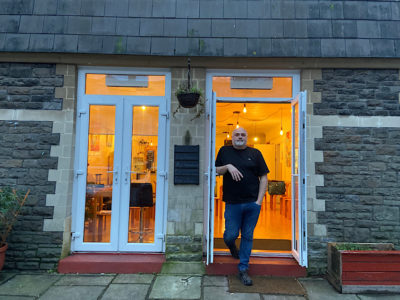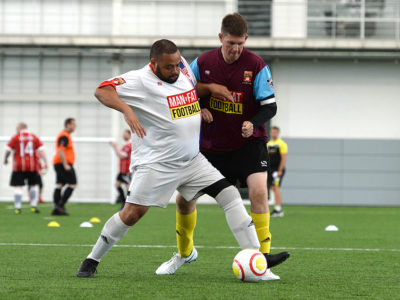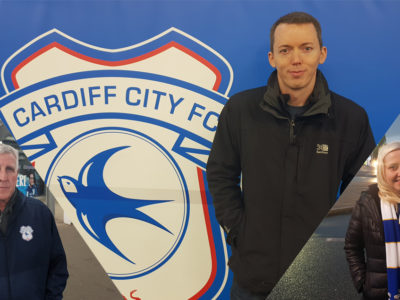Murray Harvey speaks out on homophobia in sport
A corroding portacabin that sits amid a row of caravans at the foot of Caerphilly Mountain is not, perhaps, the first image that springs to mind when picturing the office of a football manager. However, Murray Harvey is not at the helm of a top-flight Premier League side; he manages the Cardiff Dragons – a local football team with a difference.
Established in the summer of 2008, the Cardiff Dragons bill themselves as Cardiff’s first, and only, specifically gay-friendly football team. With support from the Gay Football Supporters’ Network, Murray and a handful of friends set up the Dragons with one mission in mind: inclusion and equality for all in sport.
No, his modest work environment may not compare with the plush suites found in the corporate labyrinth of Old Trafford, but the challenges that Murray faces on a daily basis, arguably, exceed those of Manchester United’s Sir Alex Ferguson.
Murray describes the initial challenge to get the club alive and kicking. “I remember Mardi Gras 2008. It got rained off, but we were walking around, proudly giving out fliers in our kit. From that point on, people started hearing our name and they soon started coming down to join us,” he recalls fondly.
Homophobia in Sport
Although the campaign against homophobia in sport has gathered increasing press coverage in recent months, following a meeting in June between Prime Minsiter David Cameron and some of Britain’s leading gay, lesbian and transgender sportspeople, Murray admits the fight against prejudice is just beginning. “I would imagine, given 20 or 30 years, there will be better integration in sport. However, more people in sport need to start coming out,” he says.
Murray, 28, from Tongwynlais, became manager of the Dragons two years ago, after two years as a playing squad-member. Although Murray confesses that his true passion is playing, he expresses a clear enthusiasm for the responsibilities of management. “What I try to do is build something for the gay community. So, we open our doors to everyone – all ages, genders, abilities, and sexual orientation. It creates a different atmosphere from the typically ‘macho’ competitive environment; it’s friendly and more fun.”
Screaming Queens and Macho Men
Murray is keen to stress that the Dragons do not fit snugly into one particular stereotype. Rather, the team represents a diverse cross-section of Cardiff’s gay community. “We have people with us who are screaming queens and divas. But we also have people who are very macho,” he says with a wry smile spreading across his face.
Murray talks with an infectious energy about his work at the club, and it is evident that his involvement with the team is at least partly responsible for his current happiness. “Part of the reason for me joining the team was because I didn’t know a lot of people on the gay scene and it’s like a positive stepping stone for that to occur,” he says.
Life as a Gay Teen
However, Murray has not always felt so positively about his sexuality. He confirms that he found the “coming-out” process of his teen years very difficult. This period of Murray’s life was punctuated by experimentation with drugs and eventually dropping out of his local football team, Tongwynlais FC. “I was just trying to get to terms with myself and who I was. I began smoking a lot of weed, and not turning up to training anymore,” he recalls as he shifts uneasily in his seat.
Although Murray describes himself as someone who has loved football since he was old enough to kick a ball, he struggled to feel at ease in the predominantly heterosexual teams of his youth. “The worst thing is when you feel like you’re lying to your team mates. You fear what the reaction might be. What will happen if they find out? It holds you back mentally,” says Murray, whose sentiments likely echo those of thousands of gay teens around the world struggling to gain acceptance.
Positive Outlet – Free From Prejudice
Murray’s decision to help establish a gay-friendly football team in Cardiff shows how sport can be used as a constructive tool in bringing like-minded people together. It provides an inclusive, non-discriminatory platform for those who may otherwise feel disenfranchised from “normal” society. For many of the Dragons, their membership serves as an important support mechanism. Murray says, “for some, playing with us is their first experience of gay life, and we do try and help them.” Indeed, Murray himself is testament to the importance of clubs like the Dragons, as they provide a positive outlet for gay men and women, free from prejudice.
When Murray is not busy with his managerial responsibilities or working for a landscape gardening firm, he spends time with his friends and family. After a 40-hour week in work, bi-weekly training sessions and a weekend match, Murray says, “I still have to find time to play scrabble with my granddad on a Friday.”





